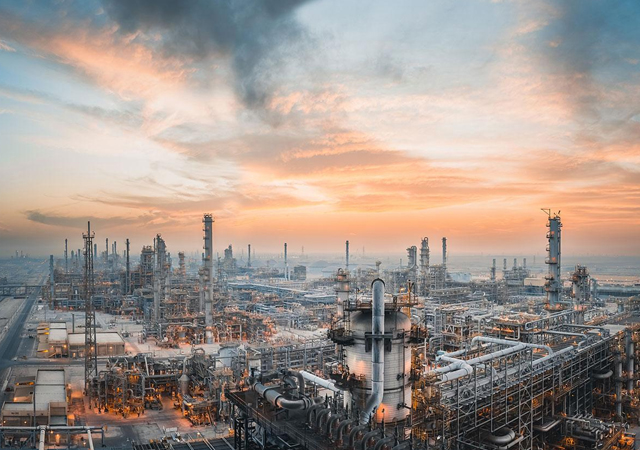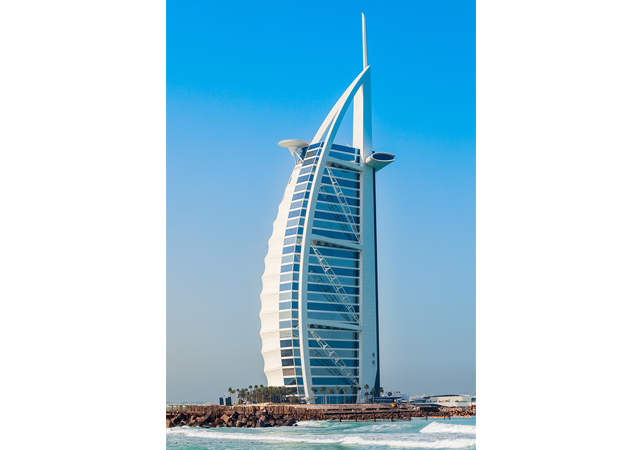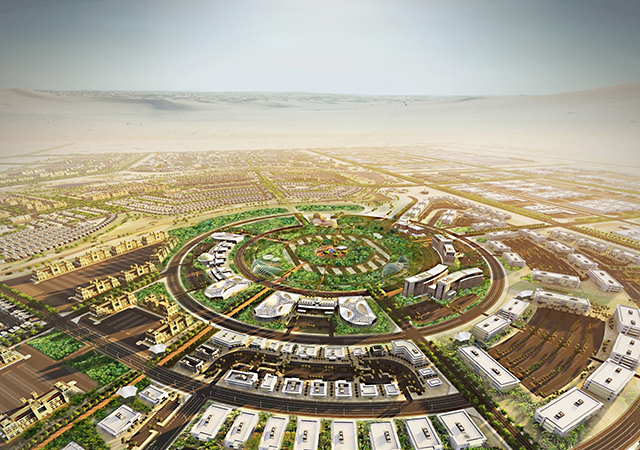
 The King Salman Energy Park (SPARK) will cover an area of 50 sq km.
The King Salman Energy Park (SPARK) will cover an area of 50 sq km.
From barren desert to a billion-dollar oasis of innovation, King Salman Energy Park (SPARK) has witnessed immense interest since it broke ground just five years ago. The mega energy hub strategically located in the Eastern Province has already attracted over 50 major players which are setting up specialised facilities involving investments of $3 billion in line with the vision for SPARK’s game-changing ecosystem.
“SPARK has attracted over 20 new investments in 2023 and we see an acceleration in the number of investments year after year. These developments represent investments of over $1 billion in 2023 alone and an accumulative investment to date of more than $3 billion once all the concluded agreements are executed,” Saif Al Qahtani, President and CEO of SPARK, tells Gulf Construction’s Bina Goveas in an exclusive interview.
Construction has also begun on 20 manufacturing centres and more will come in the year ahead, he adds.
Among the newest tenants on board are Abdulaziz & Brothers Safety Manufacturer (A&BC Reliable Protection), which produces high-quality personal protective equipment (PPE); Enjaz Al-Mustaqbal Industrial Company (Future Achievements), which plans to establish a new manufacturing facility to support the heating, ventilation, and air-conditioning (HVAC) sector; and BAAS Gulf Industrial Company, a subsidiary of the National Metal Manufacturing and Casting Company (Maadaniyah), which is set to expand its operations by Q4 2024 by manufacturing industrial valves and technical after-sales services.
Among the key tenants at SPARK, global energy conglomerate Saudi Aramco has initiated operations of its primary Drilling and Workover (D&WO) hub, Al Qahtani says.
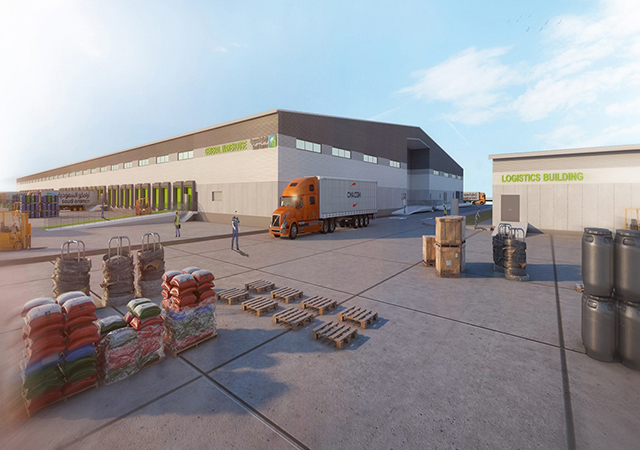 |
|
SPARK Logistics will offer warehousing and ready-built facilities. |
In addition, technology software and engineering powerhouse Emerson has begun construction of its advanced technology facilities at SPARK, which are expected to be operational in Q4 of 2024.
The energy hub has seen impressive growth since December 2018, when HRH Prince Mohammed bin Salman bin Abdulaziz, Saudi Arabia’s Crown Prince, and Prime Minister, laid the foundation stone for what is destined to become a global centre for the energy industry and technology.
“SPARK is proud to have attracted over 50 tenants to date, operating in sectors that range from digital, manufacturing, upstream, non-metallics and other commercial and industrial sectors. Some of these tenants include Honeywell, Baker Hughes, Emerson, Schlumberger, Taqa, SeAH-Dussur and others,” Al Qahtani says.
Vice President of Strategy & Business Development, Nabil Chaachou, comments: “Tenant developments and ongoing collaboration are a testament to SPARK’s commitment and ambition to fostering the ideal investment environment for both local and international companies aiming to establish or expand their operations in the region’s largest energy markets. SPARK not only enables our tenants to run efficient operations and compete in the region’s vast energy market, but also creates substantial economic value for the kingdom in one of the most sustainable parks globally.”
Contributing to Saudi Arabia’s Vision 2030, SPARK supports the kingdom’s drive for a diversified economy and aims to foster a dynamic international industrial community rooted in excellence and innovation. The energy hub is expected to contribute over $6 billion to the kingdom’s GDP annually.
With sustainability at the heart of its development programme, SPARK is the first industrial city in the world to receive Silver Level accreditation for Leadership in Energy and Environmental Design (LEED).
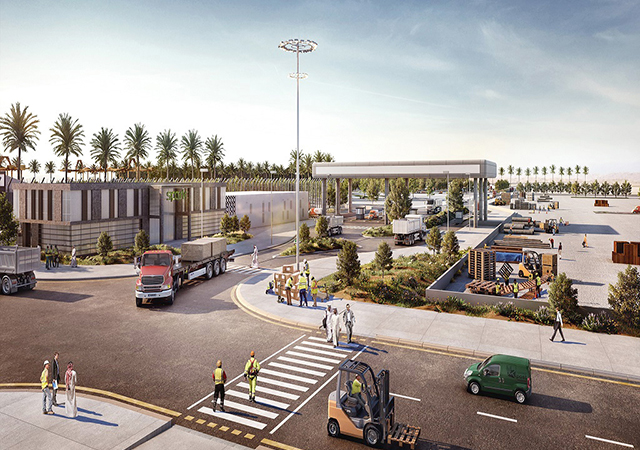 |
|
SPARK aims to foster a dynamic international industrial community. |
“SPARK is also the first to use glass-fibre reinforcing bars (GFRB) instead of steel in bridges which helps in reducing steel usage by 60 to 70 per cent and cultivating an ecosystem with a low carbon footprint. Further initiatives include the use of green concrete,” Al Qahtani points out.
In addition, SPARK is in the process of constructing a solar farm with the goal of generating 50 per cent of its power from renewable sources by 2027.
“SPARK is set to be the pioneer in the region, being the first city to have a solar farm that supplies its tenants with renewable energy,” he reveals.
It has also established a dual water network, which gives tenants the option of choosing between potable and treated water, he adds.
Excerpts of the interview:
Comment on the progress achieved at SPARK?
SPARK takes immense pride in the remarkable progress our community has been making, actively enabling growth and diversification in the Saudi economy. By localising the energy value chain and bridging global opportunities with the Saudi energy sector and beyond, we are shaping the future of the industry.
How many tenants has SPARK attracted to date?
SPARK is proud to have attracted over 50 tenants to date, operating in sectors that range from digital, manufacturing, upstream, non-metallics and other commercial and industrial sectors. Some of these tenants include Honeywell, Baker Hughes, Emerson, Schlumberger, Taqa, SeAH-Dussur and others.
 |
|
A number of industrial facilities are under construction at the energy hub. |
Contributing to Saudi Arabia’s Vision 2030, SPARK supports the kingdom’s drive for a diversified economy and aims to foster a dynamic international industrial community rooted in excellence and innovation. SPARK is expected to contribute over $6 billion to the kingdom’s GDP annually and create up to 100,000 direct and indirect jobs upon maturity.
SPARK is unique. It positions its investors at the heart of the energy market and offers an unparalleled platform equipped with top-tier, ready-to-use infrastructure and services that accelerate the industrial localisation and helps deliver sustainable value to our communities. This reinforces SPARK’s position as a leading industrial energy hub, bridging global energy organisations’ access to the Saudi energy sector and beyond.
How many new investors has SPARK attracted over the past year? Which of them have started construction?
SPARK has attracted over 20 new investments in 2023 and we see an acceleration in the number of investments year after year. These developments represent investments of over $1 billion in 2023 alone and an accumulative investment to date of more than $3 billion once all the concluded agreements are executed. Construction has also begun on 20 manufacturing centres and more will come in the year ahead.
What are the incentives offered/attractions for investors to set up operations at SPARK?
Numerous incentives and attractions for investors looking to establish operations are at play within SPARK. Its strategic location in Saudi Arabia’s Eastern Province allows for strong connections with the growing regional energy ecosystem which places investors at the heart of the energy market, with top-tier infrastructure and services. Investors are presented with the opportunity to establish their industrial facilities, factories, and businesses in an environment designed to maximise the advantages of industrial business clustering and ecosystems for their respective supply chains.
Likewise, the park’s unique plug-and-play concept allows the immediate commencement of operations and saves considerable time and costs, evidenced through plots which include ready-to-use utilities such as power, water, and gas, easy access to roads and highways, and completed licensing and permitting.
The one-stop-shop feature further enhances this by offering a comprehensive and optimal solution for a seamless transition within the park.
Comment on how SPARK is well connected to ports, airports and key cities to ensure easy access to the city.
SPARK’s strategic location and connectivity, both by road and the future GCC Rail, positions our community at the heart of the energy ecosystem. Working with Saudi Customs and international logistics service providers (LSP), SPARK is committed to providing the most efficient customs handling and logistics solutions across the GCC.
Likewise, situated in the Eastern Province, a region known for its abundant oil and gas resources and high demand for energy goods and services, SPARK Logistics is at the epicentre of the global energy market. With an inland terminal adjacent to the future GCC railway, this leading industrial energy hub ensures even more efficient customs clearance and connectivity. In addition, SPARK Logistics will offer other solutions such as warehousing and ready-built facilities to support the energy sector needs. The strategic placement between the Western and Eastern markets, coupled with proximity to key transportation routes at the heart of the global energy sector, underscores SPARK’s value in the energy industry.
Committed to accelerating the kingdom’s National Industrial Development and Logistics Program (NIDLP) and the national logistics strategy, SPARK’s Logistics Zone is designed to propel the aspirations of Vision 2030 forward by enabling a global reach and driving a seamless transition of goods and services within the supply chain, strengthening the efficient operations of the kingdom’s logistics sector.
Is Aramco’s drilling and workover facility now operational?
As of November 2023, Aramco has initiated operations of its primary Drilling and Workover (D&WO) hub within SPARK. The presence of Aramco in SPARK is set to serve as a crucial factor in localising the oil and gas value chain. The Aramco facilities, which cover an area of 400,000 sq m, will accommodate over 1,000 employees and is predicted to significantly support the activities of Aramco’s D&WO. Several D&WO contractors and service providers have already set up operations in SPARK, and it is anticipated that more will follow, localising their facilities within this energy hub to enhance supply chain efficiencies and streamline operations.
Provide details on the residential and commercial offerings. What is the current status of these projects?
Many commercial and residential developments are planned in SPARK. In collaboration with Affordable House Company, a subsidiary of Abdullah Bin Saedan & Sons Real Estate Group, state-of-the-art residential complexes are being developed at SPARK to host many residential segments.
In line with the Saudi Green Initiatives, the unique design of the SPARK residential complexes seamlessly integrates green technologies while setting a new sustainability standard. It will offer first-rate, safe and competitive amenities for the well-being of SPARK tenants and its occupiers. Planned to be developed in phases starting in 2022, the facilities have the capacity to host thousands of employees and their families.
Entities such as SPARK Logistics and SPARK Utilities have been set up recently. What is their role?
SPARK is complemented by two subsidiaries, SPARK Utilities and SPARK Logistics, which support and drive the Park’s ambitions forward.
SPARK Utilities is the third utilities company in Saudi Arabia to be granted a licence by the Water & Electricity Regulatory Authority (WERA) to sell and distribute power.
SPARK Logistics is a joint venture created by SPARK and Hutchinson Ports to build a state-of-the-art, fully automated logistics zone and dry port designed to ensure ease of access to global markets. It will oversee a 3-sq-km dry port that will enable investors to capture the growing demand for logistics services for energy-related products in the Middle East and beyond while also serving neighbouring industrial cities. Both subsidiaries strengthen SPARK’s alignment with the kingdom’s NIDLP objectives and Vision 2030’s ambitions by offering world-class logistics infrastructure, facilitating global reach and the efficient movement of goods and services within the supply chain.
SPARK has Silver LEED certification – what helped it achieve this certification? What are the renewable energy sources being developed in the energy city?
SPARK achieved the Leadership in Energy and Environmental Design (LEED) Silver Level accreditation, becoming the world’s first industrial city to receive this green building rating, through its commitment to integrated sustainability practices. Reducing the city’s carbon footprint, creating an ecosystem for companies to grow with minimal environmental impact, and applying environmentally conscious techniques in the construction of industrial, commercial, and residential facilities across SPARK, were instrumental in achieving this certification.
SPARK is also the first to use GFRB non-metallic reinforcement bars instead of steel in bridges which helps in reducing steel usage by 60 to 70 per cent and cultivating an ecosystem with a low carbon footprint. Further initiatives include the use of green concrete, which reduces CO2 emissions from cement factories.
SPARK is in the process of constructing a solar farm with the goal of generating 50 per cent of its power from renewable sources by 2027. It has further established a dual water network, leveraging water circularity, which gives tenants the option of choosing between potable and treated water. In addition, SPARK is set to be the pioneer in the region, being the first city to have a solar farm that supplies its tenants with renewable energy.
Are there any specifications set for contractors/third-party to ensure that projects meet environmental and safety standards?
SPARK’s commitment to creating a strong socio-economic impact and supporting businesses is underpinned by our ability to effectively embed environmental and safety standards. Ensuring thorough environmental and safety standards are integrated from the construction phase right through to operations serves as the cornerstone to realising our operational excellence.
Anything else which you would like to add about SPARK and its ambitions?
SPARK is the leading industrial ecosystem with sustainability at its core, connecting the world to opportunities in the Saudi energy sector and beyond. It is committed to supporting Saudi Arabia’s transformation into a leading global player in the energy industry. By contributing to Vision 2030 and supporting the NIDLP, SPARK advances Saudi Arabia’s ambition for a diversified economy. We are proud of the progress we have made in fostering a dynamic international industrial community rooted in excellence and innovation and look forward to bridging the gap between global energy markets and our industrial ecosystem.








.jpg)




.jpg)




























.jpg)

































